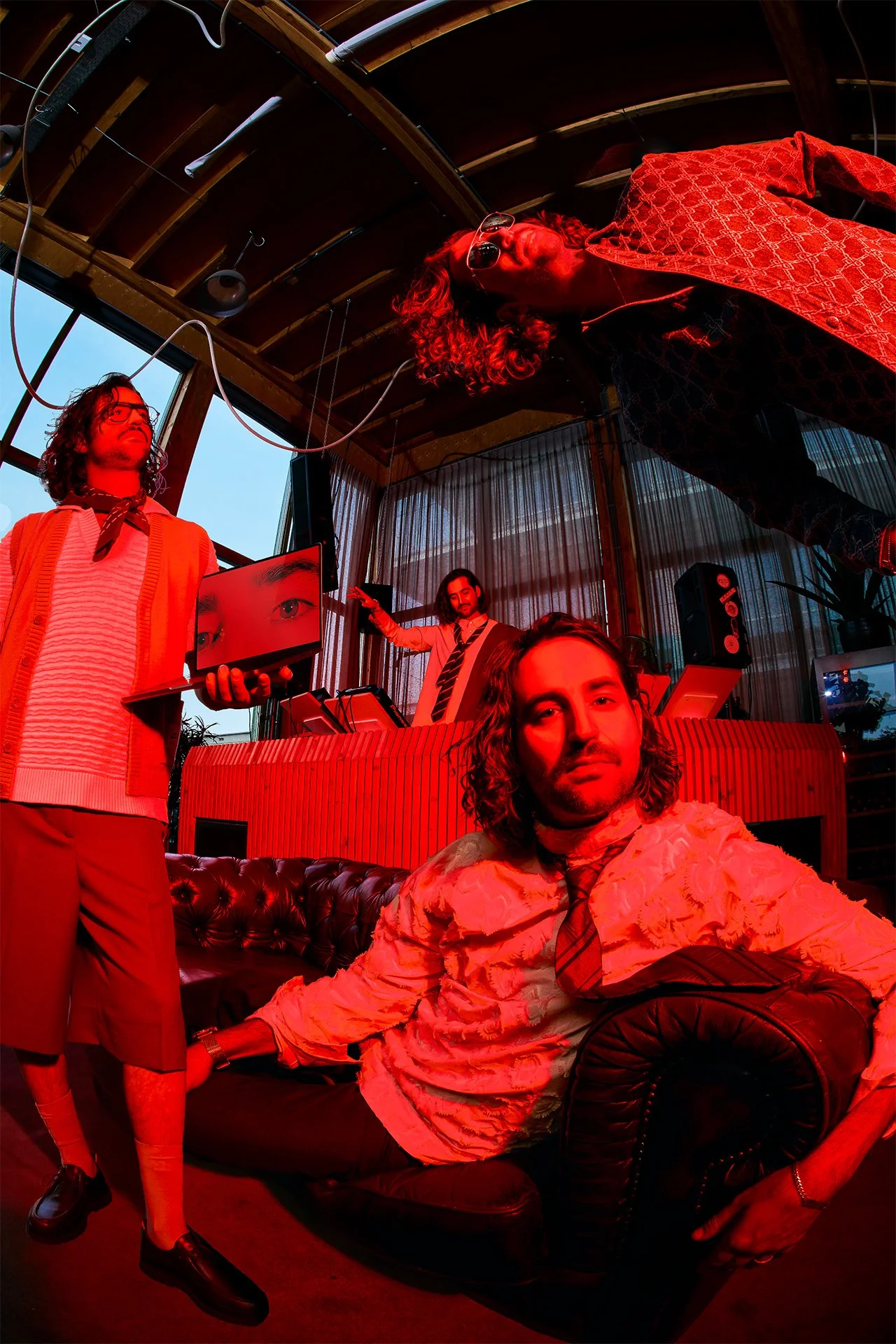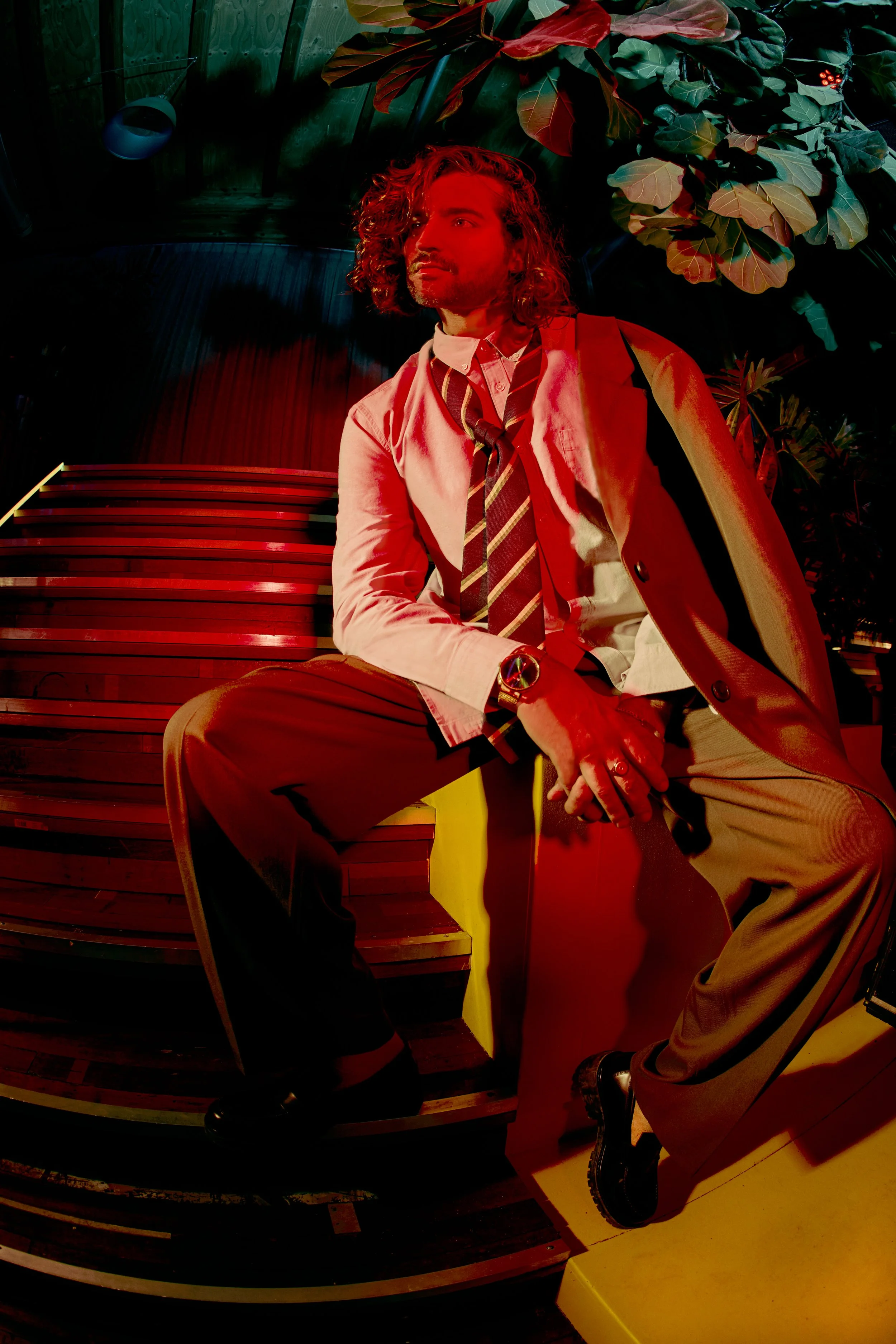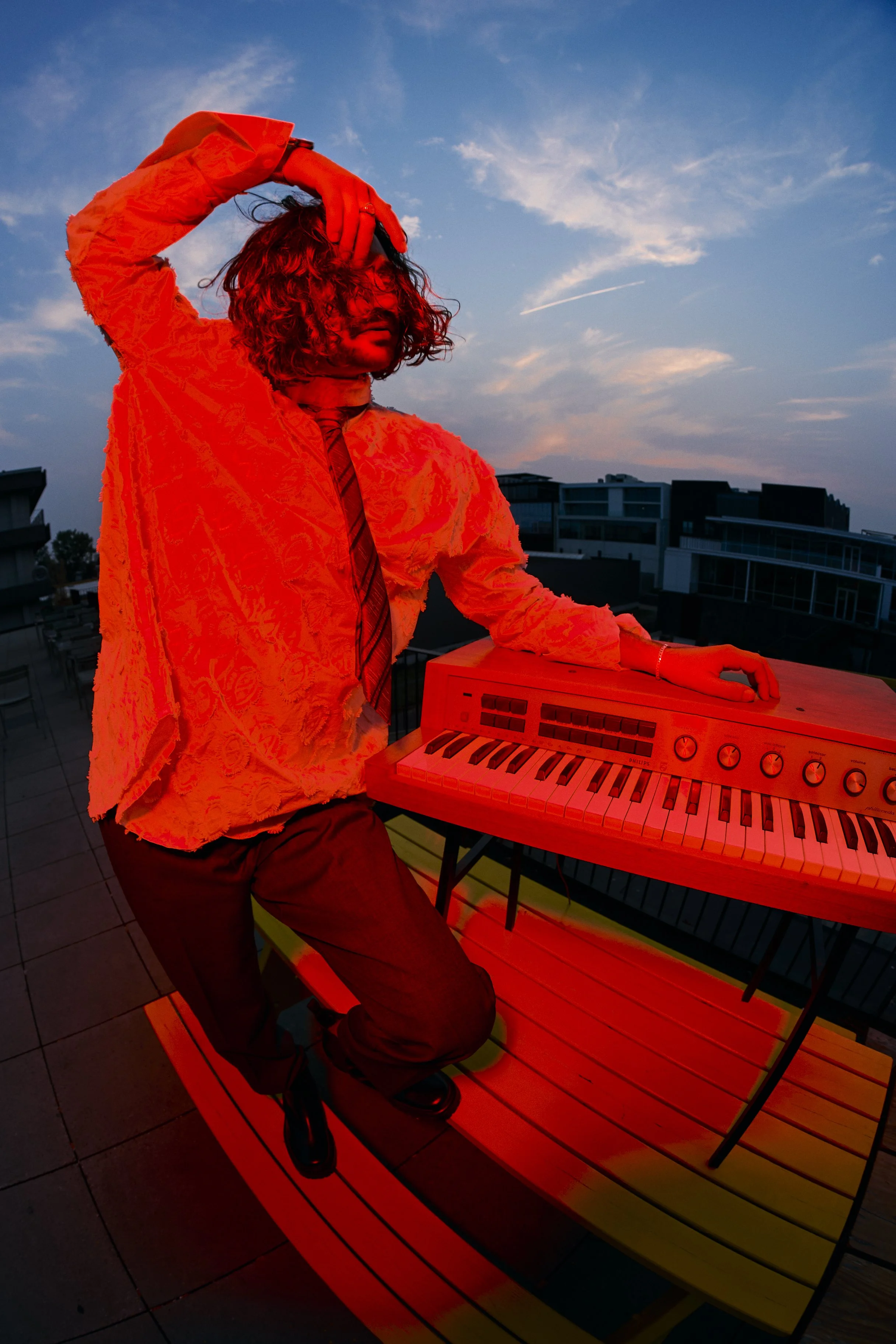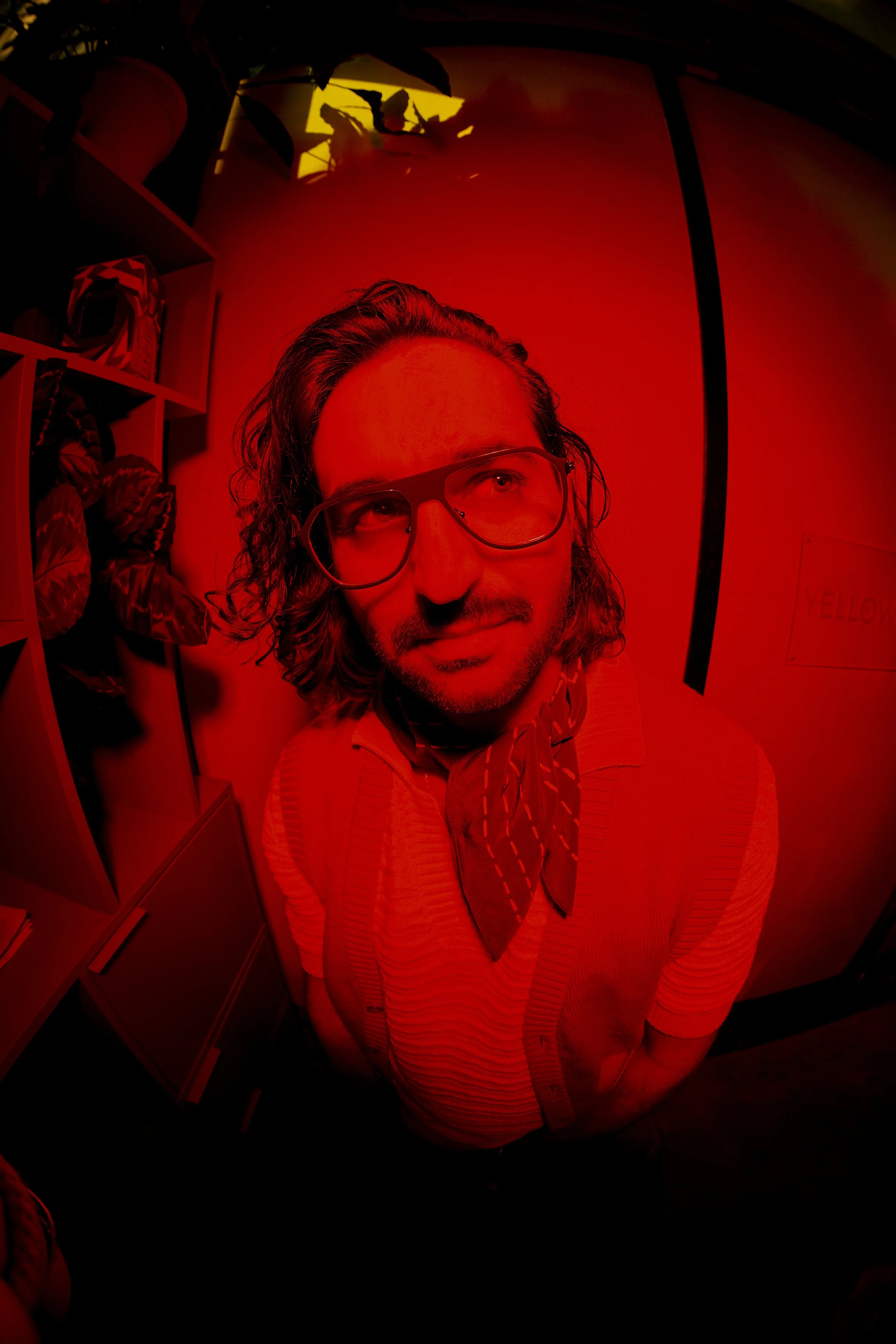IN CONVERSATION WITH SHAKÈD
interview by JOIAH LUMINOSA
Shakèd is more than just an artist—he’s a sonic rebel who thrives on breaking boundaries and embracing the raw, unpolished beauty of his creations. For the past decade, he’s been on an immersive journey through the realms of drum techniques and sound design, mastering the rules only to bend and reshape them at will.
The result? Shakèd (sjaa·ked). A name that resonates with a harmonious fusion of drifting house and minimal sounds, seamlessly moving between production, DJ sets, and live performances. His music is vibrant, unpredictable, and impossible to box into a single genre—it's an unrestrained exploration of the sonic landscape.
On stage, Shakèd’s live shows are nothing short of mesmerizing. His electrifying energy and enigmatic presence, highlighted by his signature head-banging hair, draw the audience into a captivating musical adventure. But Shakèd’s talents extend far beyond performance. As the mastermind behind the sonic identity of Yellow House, he’s crafted a soundscape that has become a magnet for DJs worldwide. Listen to his exclusive mix here.
Okay, let’s start from the beginning.
Yes, from the start of everything.
Who are you? Where do you come from? What’s your background?
Well, it's nice to have a bit of personal background, so let’s get into it. I had quite a challenging childhood. My mom is Dutch, and my dad is Jewish Moroccan. They met in Israel when it was this hot destination for young people. My mom was working in a kibbutz—it's a community where you work in exchange for food and other essentials. She fell in love with my dad, a Jewish prince of sorts, and became pregnant. At the time, my dad was in Army service, so he couldn’t leave. My mom went back to the Netherlands, and unfortunately, my dad got deeply traumatized by the war. He turned to alcohol, drugs, and eventually, criminality.
Wow, that’s tough.
Yeah, it was. The first time I met him, I was 13, and it was in jail. I went alone—it was a really intense experience. My mom had remarried by then, to the father of my brother. But when I was 8, my stepdad just disappeared. He never came back. So it was a lot for us as a family, and we really had to hustle to survive. Those times were quite hard.
That sounds like an incredibly difficult start. How did you cope with all of that?
My mom and brother both have ADHD, and I’m on the autistic spectrum with a bit of ADD. I found comfort in technical stuff—electronics were my safe haven. I’d surround myself with amplifiers, broken TVs, cell phones. That world of broken gadgets was where I made sense of everything. My room was always full of cables and batteries scattered everywhere. Even now, if you see my studio, it’s often the same chaos. But it's my happy place.
It sounds like creating that space for yourself was a survival mechanism.
Definitely. It helped me cope. I always felt like a bit of a weirdo, and that’s okay. I’ve always been different. Even as a kid, my mom would ask, "Are you really wearing that to school?" And I’d say, "Of course, this is my thing." I was the dandy kid, like Oscar Wilde, with ridiculous haircuts. It was all part of my identity.
It's interesting how you had that strong sense of self from such a young age.
Yeah, though I was pretty insecure in other ways. But with certain things, it just felt right. I always knew what I had to do, what my path was, but I fought it for a long time. Coming from a broken home, I felt this pressure to provide for myself, to be "successful." I even considered becoming a lawyer because I didn’t want to live in poverty anymore. But deep down, I’ve always been an artist.
So when did you finally embrace that artistic side?
It took a while. After high school, I started to accept who I really was. My mom played a huge role in that. She eventually encouraged me to embrace my creativity and pursue an artistic career. That push from her was a game-changer for me.
That’s beautiful. So, did you go on to study something creative after that?
Yeah, I was studying Interactive Media—super broad and not particularly exciting. One of my teachers there told me I should apply to film school for sound design. I had no idea that was even a career. But it made sense; I’d always wondered who was responsible for adding sound to films. So I applied, got in, and was selected from about 300 applicants. That experience was life-changing. It brought together everything I loved: cables, batteries, sound, storytelling, even philosophy and history.
It seems like that’s when everything clicked for you.
Exactly. It gave me a sense of purpose and helped me appreciate the importance of art. For a long time, I questioned myself. Like, "What am I doing? Why am I spending all this time in the studio? No one’s hearing it." But over time, I realized that the arts are vital—they're what make us human. They connect us on a deeper level.
What do you think makes art so important?
It’s a universal language. It’s something between us and the universe that transcends differences. It connects people. I think of art as our collective consciousness. It’s our higher voice, the soul of humanity.
That's a powerful perspective. Now, let’s talk a bit about your introduction to music. You mentioned earlier that you’re mostly self-taught?
Yeah, mostly self-taught. I first started as a drummer—I took lessons and played in several punk rock bands. But I always felt like music was something personal. I didn’t want anyone telling me how to do it. One day, I was at a friend’s house, and he was making beats on Fruity Loops. It was a life-changing moment. I was so intrigued by how much you could do on a computer. I sold my drums and dove headfirst into learning how to produce music on my own.
That’s a huge shift from being in a band to producing solo.
It was. But it felt right. With a computer, I could create so much by myself, and that really appealed to me. That moment sparked something in me, and I’ve been dedicated to figuring it out ever since.
It seems like you’ve had quite the journey in figuring things out for yourself. How long did it take for you to feel confident in your work?
Oh, it took me ages! I had no idea what I was doing, and there wasn’t anyone around to teach me. It took me like three years to figure out something as simple as putting a clap on every downbeat. I was doing live sets before I even knew what a live set was—just letting loops play for six hours straight and fiddling with knobs. It was a long learning curve. But now, I look back and laugh at it.
I love how honest you are about it! Nowadays, many people turn to platforms like YouTube for learning. Was that something you used?
Not at all! I didn’t have YouTube back then. Everything I figured out was through trial and error, just fiddling with knobs. That’s why it took me so long to produce something that sounded like a real track. For the first nine years, you probably wouldn’t want to listen to what I made. I had no clue what I was doing. I was just messing around, trying to fix things, but they’d always break in the end.
That’s fascinating. It’s clear you’re very hands-on with your learning. Were you born and raised here, or do you have roots elsewhere?
I was born here. My mom was pregnant with me when she decided to come back from her trip to Israel. It was a holiday romance for her, and she felt safer back home. So, I wasn’t raised by the Jewish side of the family, but over time, we grew closer. Now, I have a pretty good relationship with them. Although at the moment i'm afraid i might never see them again.
You seem to have a very interdisciplinary approach to your work, from sound design to visual arts. How do you balance all these different projects?
Yeah, it's definitely a balancing act! I never had formal technical training, whether for music or video. So after years of experimenting, I became comfortable with figuring things out on my own. When I need to achieve something, I’m used to finding a way, no matter how long it takes. I learned at film school how to read emotions, tell stories, and see the bigger picture, which really helps me now. Sound, for me, is about evoking emotion. Whether it’s music or sound design for a film, it’s all about conveying a feeling.
suit ARKET
shirt ARKET
tie OCTOBRE
shoes SAMSOE SAMSOE
jewellery TALENT'S OWN
That’s a beautiful perspective. You mentioned before about the difference between creating music and sound design—how do you see them both in your work?
In music, I’m the instigating incident. I’m the one creating something from scratch. In film, the story or image instigates the emotion, and I just reflect that with sound. It’s more about reacting than creating from nothing, which I actually enjoy. Film is a collaborative effort—it’s a team sport. I love how the whole crew adds a bit of storytelling, and I bounce back my interpretation of that in sound.
Have you ever had people tell you to focus on one thing rather than juggling multiple fields?
Oh, all the time! One of the biggest challenges of my career has been convincing people that I can do all of it. Some clients stop booking me for sound jobs because they see I’m in the club every weekend or promoting parties. They think I can’t balance both. It’s frustrating because people assume I’m not giving 100% to anything. But honestly, these things fuel each other. For me, curating, making music, and sound design all blend together. They marry each other perfectly.
That’s such an inspiring mindset. It must be tough dealing with those assumptions. How do you stay focused amidst all that?
Yeah, it’s tough, but I’ve learned to let my distractions work for me. I have ADD, and a lot of people with ADD or autism will tell you that when you need to do something important, you often get inspired to do something else. So, I let myself go with the flow. If I have a deadline for an EP, I know I’ll suddenly get inspired to do something else. But I let it happen because I’m still being productive in a different way.
That’s such a unique approach! It sounds like you’ve really figured out how to make your process work for you.
Yeah, it’s taken time, but it works for me. I think being multidisciplinary proves that humans have so many capabilities beyond just being a “producer” or “curator.” We’re complex beings with layers, and we can do multiple things well. I think the way I dress and present myself also reflects that—it's like my business card, showing my multiplicity.
Absolutely! The way you present yourself is such an extension of your creative persona. Speaking of which, do you have any style icons or fashion designers you admire?
Oh, so many! I love suits, the craftsmanship that goes into them. Fashion, for me, is like fine art. The fabrics, the details—it’s all so delicate and beautiful. It’s like good wine and cheese, you know? The finer things in life make everything more beautiful, and fashion is definitely one of them.
suit DAILY PAPER
loafers ARKET
sunglasses TOD'S
jewellery TALENT'S OWN
I love that analogy! How do you think fashion and music intersect for you?
They’re both abstract forms of expression. With fashion, you’re creating something that tells a story without words, just like music does. There’s always an idea or emotion behind a piece of clothing, just like there is behind a track. They both evoke feelings, and that’s why they go hand in hand for me.
It can be really hard to communicate emotion through a fashion piece. I mean, after all, it's fabric stitched together. But music can add color, storytelling, and emotion to that piece. It gives it life, a personality even. Would you agree that fashion and music can work in synergy like that? Any recent fashion films you've seen that left an impression on you?
Yeah, absolutely. Music can really give a piece of clothing a voice, you know? It emphasizes what the clothing is about, adds layers to its story. As for fashion films, I don't have a favorite right now, but I’m a sucker for Italian fashion—boutique brands, little t-shirt makers. I’m always impressed by how they make even the simplest things like a t-shirt feel special, you know?
Italian fashion is pure elegance. So, let’s talk about your music. You recently released an EP. What’s the story behind it?"
Yeah! It’s a five-track EP, all originals, and I’m really happy with how it came out. It reflects the different styles i make—I hate confining myself to just one genre. The EP has a mix of sounds—there’s progressive, techno, house, even some cheesy and nastier vibes in there. After years of experimenting, it feels like the right representation of my work.
That’s great! Each track has its own flavor. And you mentioned working with a label—tell me about that experience.
The label is called Det Gode Selskab, which means 'The Good Company.' They're based in Oslo, and they’re an eclectic group of people. They have an eye for quality but are so approachable and genuine. I started as a fan of their label, and now working with them feels like such a full-circle moment.
Sounds like a tight-knit and passionate crew. So this EP—does it mark a turning point for you in your career?
It definitely feels like the start of something real for me. I’ve been making music for years, but this EP signifies the beginning of my professional career as a manifested artist. I’m here, I’m not going away, and I’ve got something tangible to show for it.
That’s a huge step forward. What’s next for you? Any exciting projects on the horizon?
Gig-wise, I’ve been working with Interwave for about two years now, and it feels like home. Tracy, who runs the agency, is a big inspiration. She’s all about collaboration, helping people grow, and creating opportunities rather than competition. It’s amazing to be part of her team. My agent and manager is Dylan, and we’ve been building something special from the ground up together, which has been really fulfilling. He’s a great guy, and it's awesome to be able to grow together professionally.
I’ve always been out there with my beliefs, and now I’m seeing my world shift in that direction. Ten years ago, I felt like an outsider, but now i’m finding my people. The more unapologetically I become, the more the right opportunities and collaborations come my way.
shirt DAILY PAPER
pants SAMSOE SAMSOE
tie OCTOBRE
shoes SAMSOE SAMSOE
That sounds like a dream team! And what about other collaborations?
I’ve also had the chance to play with some of my heroes like Cabanne, who is a big established name in the underground.. It’s nerve-wracking but incredibly inspiring to work with him. He’s just someone who loves music and has never worked a day in his life because he’s doing what he loves. That’s the mindset I strive for.
That’s beautiful. You mentioned earlier feeling like a 'child of the world.' Do you think you’re being called to Paris or another big city?
Honestly, the older I get, the more I realize I’m a child of the world. I feel at home wherever I am. The world is so small, and through music, I’m constantly reminded of how connected we all are. For example, I’m about to release something with a label from South Africa, which is really exciting. I love seeing people build their local scenes with the sound I resonate with. That kind of energy is contagious.
It seems like you’re finally attracting what’s good for you—after years of finding your way and staying true to yourself.
vest GANT
shirt DAILY PAPER
scarf ARKET
jorts ARKET
sunglasses TOM FORD
Exactly. It’s like the law of attraction in action. I’ve always been out there with my beliefs, and now I’m seeing my world shift in that direction. Ten years ago, I felt like an outsider, but now i’m finding my people. The more unapologetically I become, the more the right opportunities and collaborations come my way.
That’s bold and inspiring. So, how would you define yourself now, given all your experiences?
I guess you could call me multi-disciplinary… but in reality, I’m probably more multi-undisciplinary! I never liked playing by the rules anyway.
That’s a fantastic way to put it. Well, I think we’ve covered a lot. Are you happy with how everything went?
Yeah, this was even more than I expected. I’m really happy with it. Thanks for the great conversation!
Thank you—it’s been a pleasure!
talent SHAKÈD
photography ROXANNE WILM & TATIANA VAN WAVEREN
light engineer MARC ANTHONY VAN DALEN
styling ELIANA CASA
styling assistant LINDA SCHREITER





